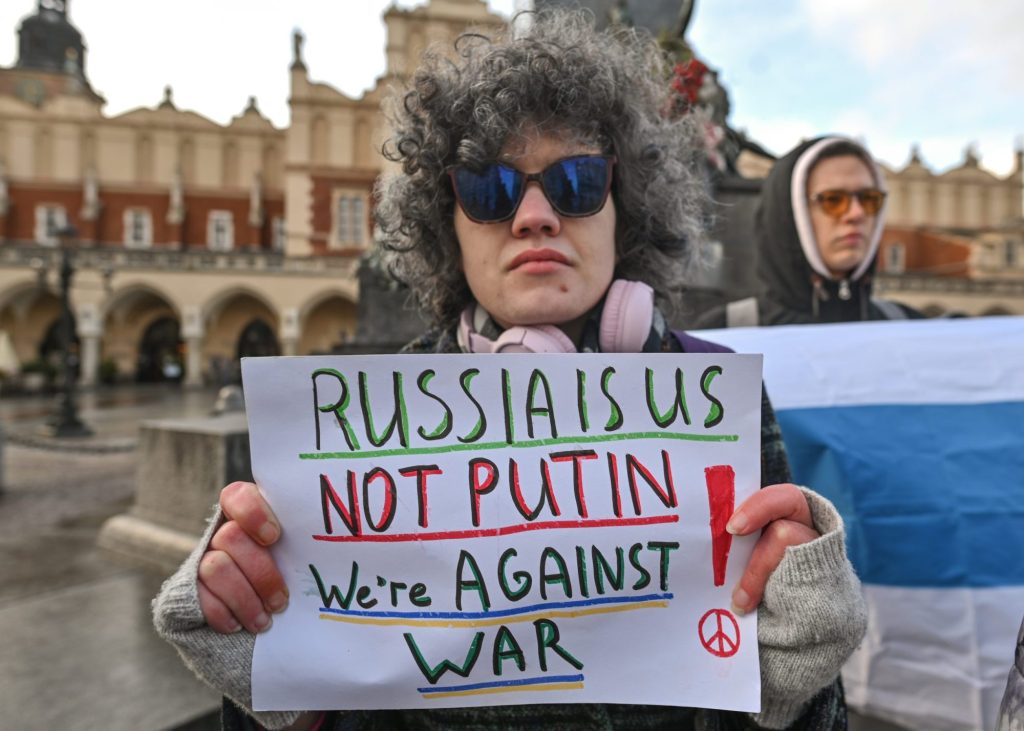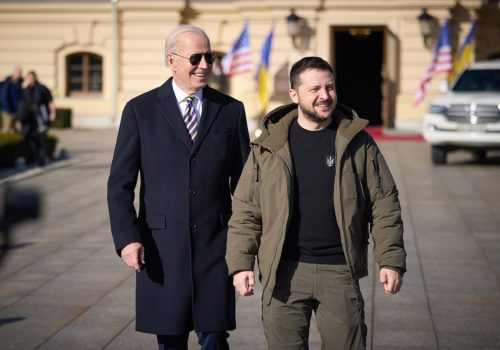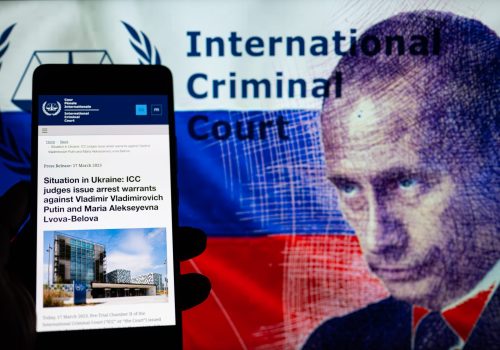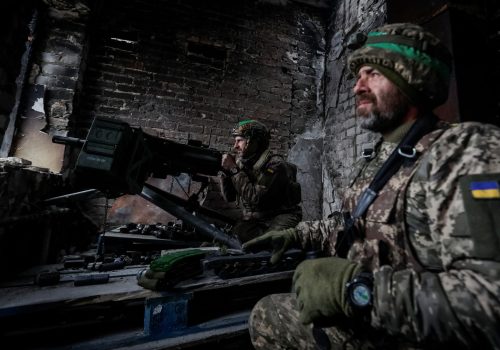Ever since the full-scale invasion of Ukraine began on February 24, 2022, the Putin regime has worked hard to present the impression of overwhelming Russian domestic support for the war effort. This has involved everything from celebrity endorsements and relentless pro-war coverage in the Kremlin-controlled mainstream Russian media, to online flash mobs and carefully choreographed mass rallies in central Moscow.
Meanwhile, a ruthless clampdown has made it increasingly difficult and dangerous for dissenting voices to be heard. Nevertheless, opposition figures continue to question the true levels of public backing for the invasion, while insisting that large numbers of Russians are either opposed or indifferent. The real situation within Russian society is certainly far more complex than the Kremlin would like us to believe, but today’s suffocating atmosphere means there is little reason to expect an increase in visible anti-war activity any time soon.
Officially at least, Putin’s approval rating has increased significantly since the start of the full-scale invasion just over one year ago. According to Russia’s only internationally respected independent pollster, the Levada Center, the Russian President’s rating rose from 71% on the eve of the invasion to 82% in March 2023. The same source indicates consistently high levels of support for the invasion of Ukraine, with over 70% of respondents expressing their approval in every single survey conducted throughout the past thirteen months.
These figures point to strong levels of public support for the war but they must be viewed in context. Critics question the validity of any public opinion polling in a dictatorship such as Putin’s Russia, where people are legally obliged to call the invasion a “Special Military Operation” and can face criminal prosecution for social media posts. This is worth keeping in mind when analyzing surveys of Russian opinion.
Many poll respondents may be inclined to demonstrate their patriotism and their support for the Russian military while being less enthusiastic about the invasion itself or the Kremlin’s war aims. Others may have become swept up in the relentless flow of pro-war propaganda or cut off from alternative sources of information. It is also important to acknowledge that a large majority of people refuse to participate in polling of this nature. They may choose to decline for a wide range of reasons, but it is possible that many simply prefer not to share anti-war opinions with strangers.
Stay updated
As the world watches the Russian invasion of Ukraine unfold, UkraineAlert delivers the best Atlantic Council expert insight and analysis on Ukraine twice a week directly to your inbox.
What evidence is there of anti-war sentiment in today’s Russia? When the invasion of Ukraine began in February 2022, efforts to claim strong public backing for the war were hampered by a series of protests in cities across the country involving mainly young Russians. However, these public demonstrations failed to reach any kind of critical mass and were fairly rapidly suppressed by the authorities with large numbers of detentions.
Other Russians have voted with their feet. A mass exodus of Russian nationals began during the first weeks of the war, with a second wave starting in September 2022 in the wake of Russia’s first mobilization since World War II. Hundreds of thousands of military-age Russian men fled to neighboring countries in the last four months of the year, leading in some cases to massive queues at border crossings.
This outflow of people has had a considerable negative demographic impact on Russia, but it would not be accurate to claim that everyone who has left the country during the past year holds anti-war views. Many chose to leave in order to avoid military service, while others feared the inconvenience of wartime conditions. Thousands of wealthy Russians have relocated to destinations like Dubai, where they can manage their Russian businesses while distancing themselves physically and psychologically from the war.
For those who remain in Russia, it is still possible to live a fairly normal life despite the imposition of sanctions and the departure of many high-profile Western brands. Meanwhile, some members of Russia’s billionaire elite are believed to oppose the war, but most see their fortunes as tied to Putin and are fearful of the consequences if they break with the regime publicly.
There are indications that the war is becoming less and less popular among the very troops charged with leading the invasion. The refusal of many contract soldiers to extend their service has forced the Russian authorities to introduce legislative changes, while in recent months there has been a sharp increase in video addresses on social media featuring mobilized Russian soldiers complaining about suicidal tactics and high death tolls. At the same time, there is little indication yet that mounting demoralization on the front lines is shaping the public mood back in Russia itself.
Eurasia Center events

What of Russia’s beleaguered political opposition? For more than twenty years, the Putin regime has sought to silence any genuine opposition forces via increasingly direct means. These efforts have intensified since the onset of the Ukraine invasion, with independent media outlets shut down and many of the country’s relatively few remaining opposition figures either jailed or forced to flee. Some have attempted to speak out against the war while in exile, with others who left Russia in previous years such as Gary Kasparov and Mikhail Khodorkovsky serving as vocal opponents of the invasion.
The most prominent opposition figure in today’s Russia, Alexei Navalny, remains in prison. Navalny has managed to issue a number of statements from jail condemning the war. In February 2023, he published a fifteen-point plan calling for the Russian military to withdraw completely from Ukraine and arguing that Russia must accept Ukraine’s internationally recognized borders. While many have welcomed Navalny’s unambiguous opposition to the invasion, others remain wary due to his ties to Russian nationalism and earlier reluctance to back the return of Crimea to Ukraine.
At this point, extreme Russian nationalism appears to pose a far greater threat to the Putin regime than liberal anti-war sentiment. A new class of pro-war bloggers has emerged over the past year and has become a powerful force within the more active segments of Russian society. Hardliners such as Wagner chief Yevgeny Prigozhin and Chechen leader Ramzan Kadyrov have gained in stature thanks to their prominent roles in the invasion and have engaged in rare public criticism of key establishment figures.
The authoritarian nature of the Putin regime makes it almost impossible to accurately gauge levels of anti-war sentiment in today’s Russia. It may take a decisive military defeat before many of those who oppose the war dare to speak up and demand change. In a sense, this is exactly what Putin is fighting against. He invaded Ukraine primarily because he feared Ukrainian democracy would serve as a catalyst for similar demands inside Russia itself. So far, he has managed to prevent anti-war or pro-democracy movements from gaining momentum. However, if his invading army’s battlefield fortunes continue to deteriorate in Ukraine, those who dream of a different Russia may finally find their voices.
Christopher Isajiw is an international relations commentator and business development consultant to private, governmental, and non-governmental organizations.
Further reading
The views expressed in UkraineAlert are solely those of the authors and do not necessarily reflect the views of the Atlantic Council, its staff, or its supporters.

The Eurasia Center’s mission is to enhance transatlantic cooperation in promoting stability, democratic values and prosperity in Eurasia, from Eastern Europe and Turkey in the West to the Caucasus, Russia and Central Asia in the East.
Follow us on social media
and support our work
Image: A Russian activist in Krakow on February 25, 2023. (Photo by Artur Widak/NurPhoto)




